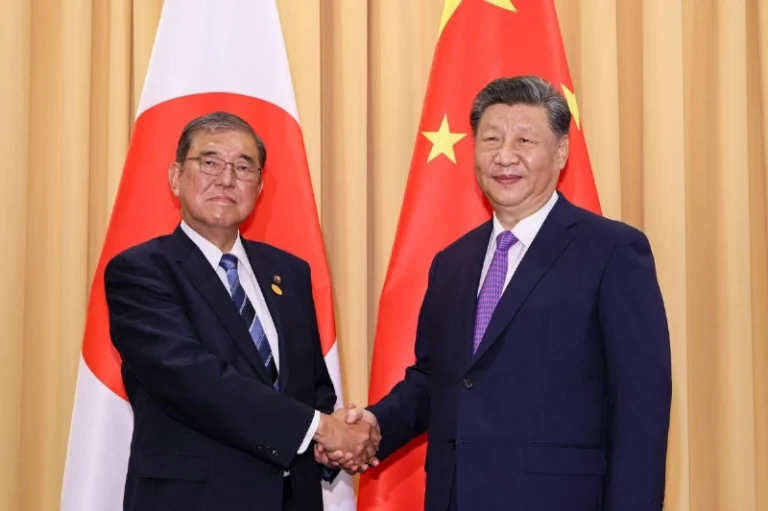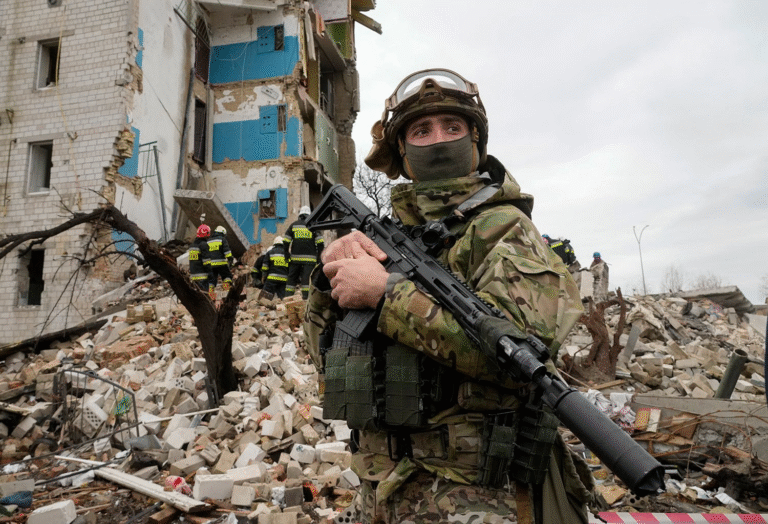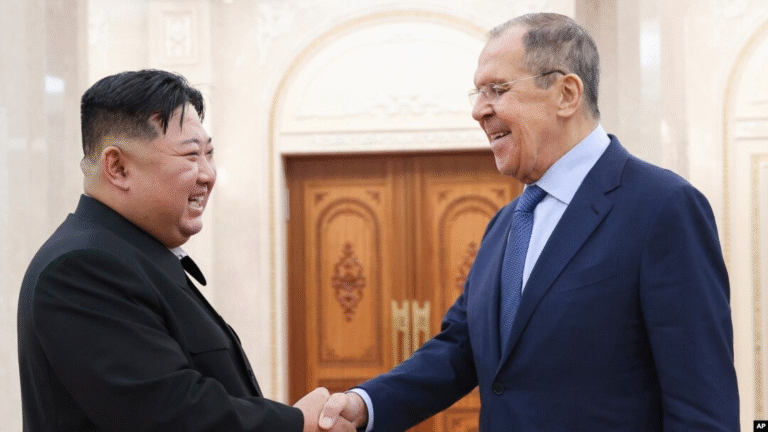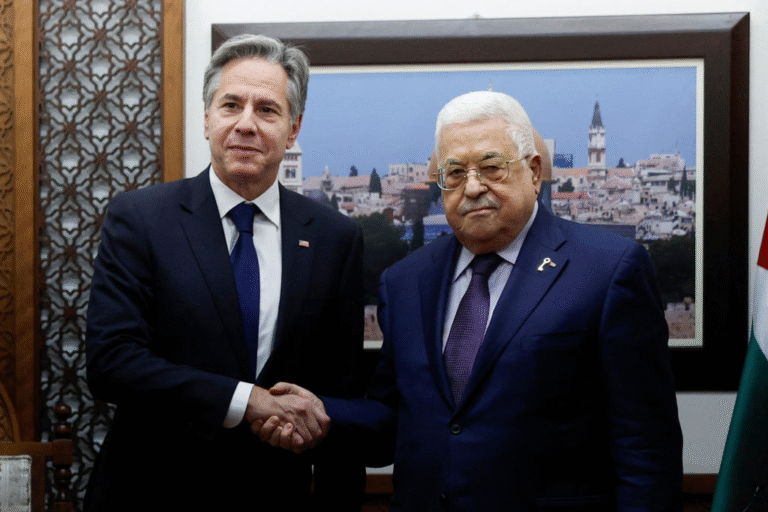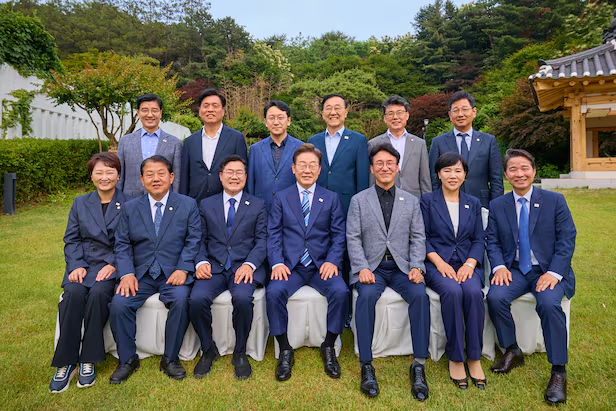
South Korean President Lee Jae-myung holds a group photo with Democratic
Party of Korea’s National Assembly lawmakers at its official Presidential
residence in Hannam-dong, Seoul, on 7 June 2025. Photo credit: The Chosun
Hutton Ward
The America-Eurasia Center
www.EurasiaCenter.org
East Asia Program
Eurasia News
Lee Jae Myung and the Democratic Party of Korea succeeding in securing both the
parliament and presidency earlier this month in snap elections. More than 6 months of political
turmoil preceded the contested elections, including various court cases brought against elected
officials and a declaration of martial law. After such a tumultuous period, the new administration is
looking forward with a large docket of progressive reforms aimed at addressing critical faults in
South Korea’s economy and society. However, the new administration cannot be separated from
the circumstances in which it arose. It must face the challenge of not only addressing pressing
policy concerns, but also a deep national divide with possibly steep consequences for the future of
South Korea’s democracy.
Yoon Suk-Yeol was elected President of South Korea in 2022 under the People’s Power
Party. Winning by a tiny margin, his approval ratings dropped precipitously while in office.1
Parliamentary elections following this election resulted in the Democratic Party gaining seats,
giving them the majority, effectively paralyzing Yoon’s agenda. Following these elections, rumors
began to swirl of the possibility of martial law, especially given South Korea’s history with military
rule.2 Despite dismissals, Yoon’s frustration with the opposition party eventually led to this
declaration on December 3rd, where he accused the Democratic Party of anti-state activities,
accusing them of collusion with North Korea and criticizing their budget policies
In the following chaos, South Korean lawmakers climbed barricades, and then Parliament
Member Lee Jae Myung livestreamed his entrance as he and other lawmakers attempted to enter the
parliament building to end the crisis. In the aftermath, Yoon was subjected to impeachment
proceedings and arrested, along with several other government ministers, leading to months of
political instability. With three interim leaders taking control during the interim period, the
finalization of Yoon’s impeachment brought about the announcement of snap elections. Lee was
immediately the frontrunner, seizing a solid lead in the polls as mistrust of the People’s Power
Party remained forefront in the public mind. On June 3rd in the evening the election was called for
Lee with 49% of the total votes, as the election saw a high turnout of 79% of eligible voters,
reflecting the increased political awareness in the months following Yoon’s impeachment.
The end of the elections brings only new challenges for Lee, as he is set to confront a
divided South Korea, renewed tensions with the North, and a chaotic international arena following
the announcement of the Trump tariffs. Additionally, he faces controversy because of an election
law violation suit brought against him for allegedly making false statements during his 2022
presidential campaign, which although postponed as a result of his position, remains a point of
resentment for the opposition. However, Lee promises big reforms in the face of these challenges,
with a sweeping platform addressing many of these issues, and steps already being taken to ensure
his ideas for the country are implemented.
Domestically, Lee looks to first and foremost reunite the country following the martial law
declaration, which has led to polarization and political animosity, with hopes to change the process
by which Martial Law can be declared.8 Additionally, in following with his left-wing, populist
politics, he has proposed several economic reforms aimed at improving the quality of life of the
average South Korean, while also improving efficiency. These include a shortened workweek, tax
benefits for parents to incentivize them to have more children, investments in small businesses
along with a large push for the development of artificial intelligence. Additionally, in response to the danger posed by U.S. tariffs to the country’s domestic industries, Lee has stressed the
importance of adaptation, pointing out that the rise of protectionism globally is not a fad.
Abroad, one of Lee’s top priorities is working to de-escalate tensions with the North
Koreans diplomatically. Lee has proposed reopening the military hotline between the two countries,
along with restoring the 2023 security agreement to improve cooperation on the path to total
denuclearization of North Korea. Additionally, he has begun taking smaller steps in showing
South Korea’s willingness to work with the North following the hostile Yoon regime, including
shutting down propaganda speakers along the DMZ. Outside of the peninsula, Lee has already
made it clear that he will continue the strong relationship between South Korea and the United
States, both economically and militarily, while balancing it against the country’s relationship with
its close neighbor, China, in order to avoid unnecessary conflict.13 In the face of these rising
tensions, Lee has announced South Korea will look to expand its network of allies, strengthening ties with the EU along with the “Global South” in pursuance of a more broad based strategy of
defense and trade cooperation.
Lee’s vision for South Korea is one entrenched in his pragmatic, populist politics, which
lead him to sometimes stray from traditional liberal viewpoints in favor of what he sees as more
beneficial for the nation, such as his enthusiasm for strengthening ties with the United States. This
energetic approach to governance has already stumbled, with the DPK’s plan to increase the
number of Supreme Court Justices to lessen their workload stalling in the face of opposition
criticism. They allege the DPK planned to use this approach to sway judicial decisions—
strengthening their ability to enact policy. Though Lee and the DPK will continue to face setbacks
because of their swift policymaking strategy, their hope is that in this pragmatic approach, the
wounds opened through Yoon’s martial law attempt will be healed. Though early in his presidency,
this dual approach of attacking the many existential threats that face Korean society, such as the
birth rate crisis and the Chinese American conflict, while simultaneously attempting to use these
issues to bring Koreans together will continue to define his term.
Bibliography
Da-gyum, Ji. “Full Text of South Korean President Yoon Suk Yeol’s Emergency Martial Law
Declaration.” The Korea Herald, December 3, 2024.
https://www.koreaherald.com/article/10012293.
Editors, C. F. R. “Martial Law in South Korea | Council on Foreign Relations.” Accessed June 9, 2025 https://www.cfr.org/blog/martial-law-south-korea. “Lee Jae-Myung Wins South Korea Election after Months of Martial Law Chaos,” June 3, 2025.
https://www.bbc.com/news/articles/c861yyqxg4do.
Pardo, Ramon Pacheco. “What to Expect From South Korea’s New President.” Foreign Policy
(blog), June 25, 2025. https://foreignpolicy.com/2025/06/05/south-korea-president-election-
results-lee-jae-myung-foreign-policy/.
Published Jun 5, 2025 4:56 pm KST, and 2025 6:55 pm KST Updated Jun 5. “Supreme Court
Expansion Plan Delayed amid Criticism – The Korea Times,” June 5, 2025.
https://www.koreatimes.co.kr/southkorea/politics/20250605/supreme-court-expansion-plan-
delayed-amid-criticism.
Reuters. “South Korea President Lee’s Election Law Violation Hearing Postponed Indefinitely,
Court Says.” June 9, 2025, sec. Asia Pacific. https://www.reuters.com/world/asia-
pacific/south-korea-president-lees-election-law-violation-hearing-postponed-indefinitely-
2025-06-09/.
“South Korea: New Leader Lee Jae-Myung Pledges to ‘unite’ a Divided Country,” June 4, 2025.
https://www.bbc.com/news/articles/cq549p1yd2eo.
“South Korea New Leader Lee Jae-Myung’s Policy Pledges | Reuters.” Accessed June 9, 2025.
https://www.reuters.com/world/asia-pacific/south-korean-presidential-frontrunner-lee-jae-
myungs-policy-pledges-2025-05-13/.
“South Korea Turns off Propaganda Loudspeakers to North Korea.” Accessed June 17, 2025.
https://www.bbc.com/news/articles/c4g65nrek75o.
“South Korea’s President Yoon Removed from Office over Martial Law Decree | Politics News | Al
Jazeera.” Accessed June 11, 2025. https://www.aljazeera.com/news/2025/4/4/south-koreas-
constitutional-court-removes-president-yoon-from-office. “South Korea’s Short-Lived Martial Law: How It Unfolded and What’s next.” Accessed June 9, 2025 https://www.reuters.com/graphics/SOUTHKOREA-POLITICS/GRAPHICS/lgpdjajkbpo/.
